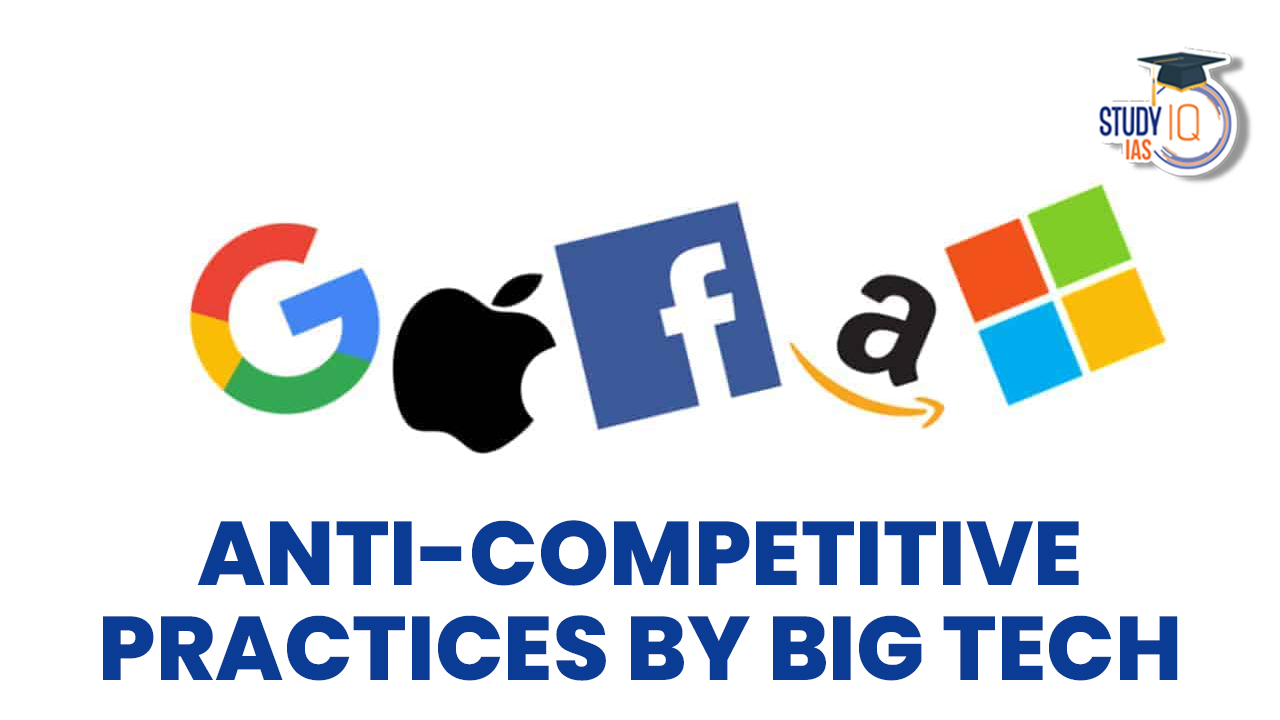Table of Contents
Context: A parliament committee has asked a government panel on digital competition law to focus on ten anti-competitive practices by the big tech firms.
What is Big Tech?
- Big Tech, also known as the Tech Giants, is a term used to describe the most dominant companies in the information technology industry, majority of who are centered in the United States.
- The Big Tech are further classified as Big Four or Big Five presently consisting of Alphabet (Google), Amazon, Apple, Meta (Facebook)—with Microsoft completing the Big Five.
- Significance of Big Tech in the world:
- Economy: The impact of Big Tech is felt on a global level. They are continually looking to expand their reach, influencing domestic economy of almost all countries.
- Society: Big Tech influences societal change by being accessible to the masses. The products of these companies are widely used and can impact the consumer choices.
- Politics: Big Tech have the reach and capability to create political opinion. These can be in form of political ads on their platform and also promoting opinion of certain political leaders on social media.
- National Security: Since Big Tech operate across the world, countries claim that these companies support rival economies, which ultimately affects national security. Ex: Huawei was blamed by the US for spying on behalf of China.
- Technology: The Big Tech are well known for their innovation and technology development. They are the first to introduce ground-breaking technologies.
Anti-Competitive Practices by Big Tech Companies
- The Standing Committee on Finance (Chair: Mr. Jayant Sinha) submitted its report on ‘Anti-Competitive Practices by Big Tech Companies’ in December 2022.
- The committee has identified 10 types of anti-competitive practices which are practiced by Big Tech companies as:
| Anti-Competitive Practice | Description |
| Anti-Steering Provisions |
|
| Platform Neutrality/ Self Preferencing |
|
| Adjacency/ Building and Tying |
|
| Data Usage (use of non-public data) |
|
| Mergers and Acquisitions |
|
| Pricing/ Deep Discounting |
|
| Exclusive Tie-ups |
|
| Search and Ranking Preferencing |
|
| Restricting Third-Party Applications |
|
| Advertising Policies |
|
Recommendations by the Committee
To ensure a fair, transparent, and contestable digital ecosystem, India needs a Digital Competition Act based on the unique needs of digital markets. On lines of global ex-ante approaches, this Digital Competition Act should:
- Define and identify a small number of Systemically Important Digital Intermediaries (SIDIs)/Digital Gatekeepers that can negatively influence competition.
- Impose ex-ante competitive restraints on SIDIs in India to regulate competition in digital markets.
- Global Harmonization of digital regulations to reduce the regulatory burden for companies and help Indian companies compete globally.
- Harmonize competition law with Consumer Protection Act 2020 and the e-commerce rules under it.
- Mechanism to ensure fair compensation to the consumers.
- Revamping CCI (Competition Commission of India) and strengthening it to take new responsibilities.
- E.g., Setting up specialized digital Markets within the commission with skilled experts, academics, and attorneys.
- Prescribe a code of conduct with specific measures for SIDIs to prevent them from abusing their market power to stifle competition.
Big Tech regulation in India
- In India, antitrust issues are governed by the Competition Act, 2002, and the Competition Commission of India checks upon monopolistic practices.
- So far, big tech companies in India are protected by the safe harbour of the Communications Decency Act (CDA) of the USA along with its Indian counterpart Section 79 of India’s Information Technology Act, 2000 (IT Act).
- Safe harbour – as prescribed under Section 79 of the IT Act, 2000 – is legal immunity that online intermediaries enjoy against content posted by users on their platforms.
- However, now India is working on its own Digital India Act—a replacement of IT Act 2000 along with many others like Telecom bill, data localisation and others.
Big Tech regulation across the world
| Europe |
|
| USA |
|
| Australia |
|


 Phone-tapping in India, Legal Framework ...
Phone-tapping in India, Legal Framework ...
 Jharkhand High Court Assistants Admit Ca...
Jharkhand High Court Assistants Admit Ca...





















